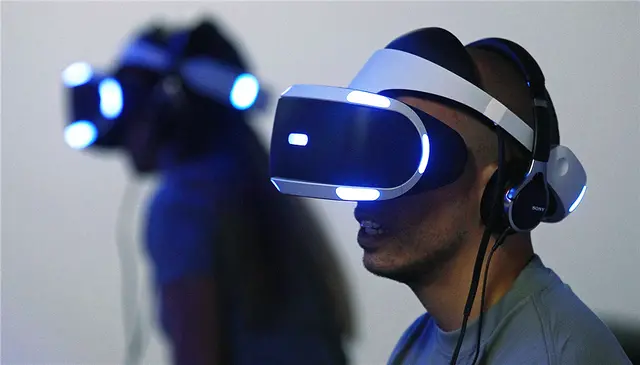A gamer plays a game with the Playstation VR during the‘Paris Games week in October 2015. Photograph: Chesnot/Getty Images
(THE GUARDIAN) A major consumer electronics firm has become the first to launch a mass-market virtual reality headset, in what could be the move that takes VR technology into the mainstream.
Sonysaid that its PlayStation VR headset, which works with the PlayStation 4 console, would be launched in October for $399 in the US and £349 in the UK.
The device, which fits over the wearer’s head, features a high definition screen and motion tracking technology, allowing players to inhabit and explore computer generated worlds.
The pricing, revealed at the Game Developers Conference in San Francisco on Tuesday, makes PlayStation VR the cheapest in the current wave of virtual reality devices, which include Facebook’s Oculus Rift ($599/£499) out in April .
The Rift headset however, requires a connection to a high end desktop PC which will cost at least £800 – the PlayStation 4 currently retails at £250. The only cheaper variant is made by Samsung which is also pushing a Gear VR headset, priced cheaper at £80, but uses a less powerful £580 Galaxy smartphone as its screen.
Industry experts said that this was the best opportunity for VR technology - long the province of Sci-Fi movies - to move into the consumer mainstream.
“The PS4 install base is huge – over 35m units have been sold – and there are currently more than 100 games confirmed for the PlayStation VR device,” said Dan Page of Opposable VR, a Bristol studio specialising in virtual reality.
“As it’s powered by the PS4 you’d expect a big compromise in terms of performance compared to the Rift and Vive, but some very clever thinking from Sony has meant this isn’t necessarily the case.”
It will be the quality of the first VR games and applications that will decide whether the technology succeeds. Among PlayStationVR’s key offerings are a gritty gangland shoot-’em-up, London Heist, a visually impressive 3D drawing package Dreams, and the next title in the multimillion-selling Gran Turismo series of driving sims.
Sony says that more than 230 developers are working on games for the device, including major publishers such as Ubisoft, 2KGamesand Electronic Arts – the latter has revealed that it will release a PlayStation VR mode for its massively successful shooter Star Wars: Battlefront. Over 50 titles are expected to be available by the end of 2016.
The company is also making its VR games collection free to all purchasers of its headset. The demo contains one title, Monster Escape, that lets the headset wearer play as the monster while four other participants take part on via a TV, attempting to capture the creature.
Sony is heavily pushing the concept of games that use the TV screen as well as the PlayStation VR headset, meaning that people who are not wearing the device can join in. “A real issue with VR is how socially acceptable it’s going to be in the home,” says virtual reality developer Katie Goode. “PlayStation VR is directly challenging this with its social screen idea. Allowing other people to join in with the VR player via the TV screen means that nobody has to be a alone in VR, and nobody else is left out.”
However, there are still doubts about the viability of virtual reality as a mass consumer technology. It’s currently expensive, the headsets are large and unwieldy, and a percentage of users are likely to suffer motion sickness unless movement within the games is heavily restricted. Many point to the failure of 3D TVs several years ago, which required users to don special glasses that were much less intrusive than VR headsets. Although Sony has sold almost 400m PlayStation consoles since the original arrived in 1994, it has struggled with more experimental offshoots and peripherals: its PlayStation Move motion controllers did not sell well, neither has the PlayStation Vita handheld console.
At this lower price and with the might of an established entertainment technology giant behind it, however, the PlayStation VR is going to be a vital test for consumer VR this year. “It could very well be the most important VR headset, at least for an early mainstream audience,” said Nick Pittom of VR developer Fire Panda. “Certainly Electronic Arts and other game publishers will be watching it with great interest and basing future investment and development on it’s success.”
For Sam Watts, a VR producer at Tammeka Games, the success of the platform - and for VR in general - will rest upon letting potential consumers try the tech before they buy – which is where Sony’s established retail channels will come into play. “It needs to be available everywhere, to try out in shops, before it can become a consumer success,” he said. “Many gamers are vocal critics of VR – you really have to try it to understand it. But when people finally get their hands on one, they will, like the rest of us, become converts.”
 简体中文
简体中文



